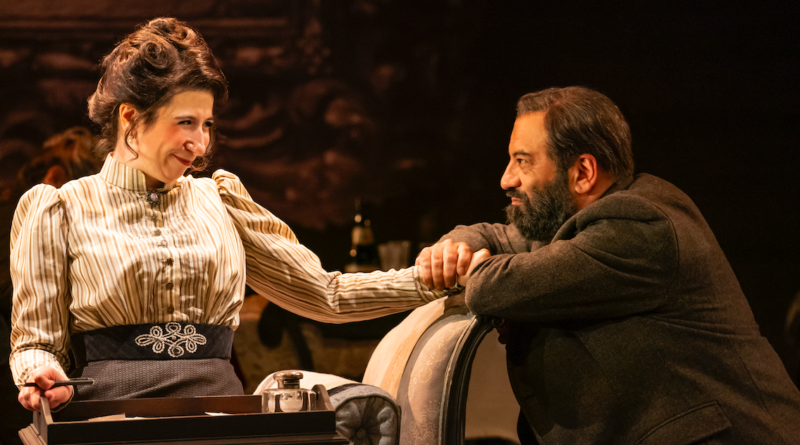REVIEW: ‘Leopoldstadt,’ the latest from Tom Stoppard, is a new classic
Photo: Jenna Augen and Aaron Neil star in Leopoldstadt on Broadway. Photo courtesy of Joan Marcus / Provided by BBB with permission.
NEW YORK — Celebrated playwright Tom Stoppard has brought his newest dramatic venture to the Longacre Theatre. Leopoldstadt recently opened on Broadway, and in some ways, the show feels like classic Stoppard, while in other ways, these intermissionless two hours are breaking new ground for the playwright.
There’s no denying that the play, as it charts the intricacies of an extended family and their relationships from 1899 to 1955, feels deeply personal to Stoppard. There is much talk about the family’s mixed religious practices of the Jewish and Christian faiths, and eventually their fates are impacted by the rise in anti-Semitism and the Nazis coming to power. The scene in 1938, in particular, is gut-wrenching and shattering for the family as they must face enhanced scrutiny for their Jewish heritage and a violent upheaval to their lives in Austria.
There are many characters in this family drama, but Stoppard’s deft writing keeps everything orderly and understood. There are some roles who continue from scene to scene, and the audience is able to watch these characters age and change. David Krumholtz plays Hermann, son to Grandma Emilia (Betsy Aidem). Faye Castelow’s Gretl is marred to Hermann, and their marriage receives much of the microscope in the 1899 and 1900 scenes. Questions of fidelity and loyalty are put to the test, although they seem trivial compared to the family’s weakening prospects in the 1924 and 1938 scenes.
There are stellar performances turned in by many of the ensemble members, including Aaron Neil as Ernst, a character married to Wilma (Jenna Augen). Another strong addition is Caissie Levy’s Eva, who is married to Brandon Uranowitz’s Ludwig. As the year pass, these couples’ children and eventually grandchildren take centerstage, and the previous generation slips into the wiser and older roles, if they are so lucky. The family faces devastating personal ramifications for the rise of fascism in Europe and the onset of the world wars, and unfortunately not everyone survives from one era to the next.
There is a family tree available for audience members to make clear connections, but honestly one of the best methods of appreciating Leopoldstadt is to immerse oneself in the conversations, the relationships, the struggles and the triumphs. Keeping track of everything and everyone seems secondary to understanding how this family functions as a group of loved ones.
Stoppard is arguably the best living playwright in the English language. His plays, including The Coast of Utopia, Arcadia, Rock ‘n’ Roll and Travesties, have built a specific style that has become something of a trademark for the writer. He enjoys writing long sagas that involve many characters speaking eloquently about music, art, politics, history and culture. Sometimes his shows can be inaccessible-feeling because of their high-minded conversations and intricate plots. The Coast of Utopia, after all, is an epic that could take three days to appreciate.
Leopoldstadt seems more personal, more accessible and more intimate than most of his other shows (note to reader: this reviewer counts himself a big fan of Stoppard’s oeuvre and is somewhat tired of the common refrain that audiences can no longer take “smart” dialogue). This expansive family drama, directed by Patrick Marber, parallels some of the chapter headings from Stoppard’s own life of being born in Czechoslovakia. How WWII ravaged his family, how questions of Jewish identity were talked about, how memories were passed down from generation to generation, these are part of his life and his story, and they are also part of Leopoldstadt.
After spending two hours with these relatives, one definitely feels a great deal of compassion and interest in their individual stories and the collective story that binds them together. There are moments of wonderful joy and deep, deep sadness. Violence eventually enters the home, and the implausible danger of the outside world becomes part of their internal struggle. There are many lessons to be learned from watching Grandma Emilia, her children, her in-laws, her grandchildren and the memories she leaves behind.
Stoppard may have written a play that’s more accessible, but it’s right up there with his best. He gives his creations space to live their lives in front of the audience, even when their lives are in peril from outside forces hellbent on their destruction. This is a study in poetry amidst perseverance.
By John Soltes / Publisher / John@HollywoodSoapbox.com
Leopoldstadt, written by Tom Stoppard and directed by Patrick Marber, is now playing the Longacre Theatre on Broadway. Running time: 2 hours, 10 minutes with no intermission. Click here for more information and tickets.

